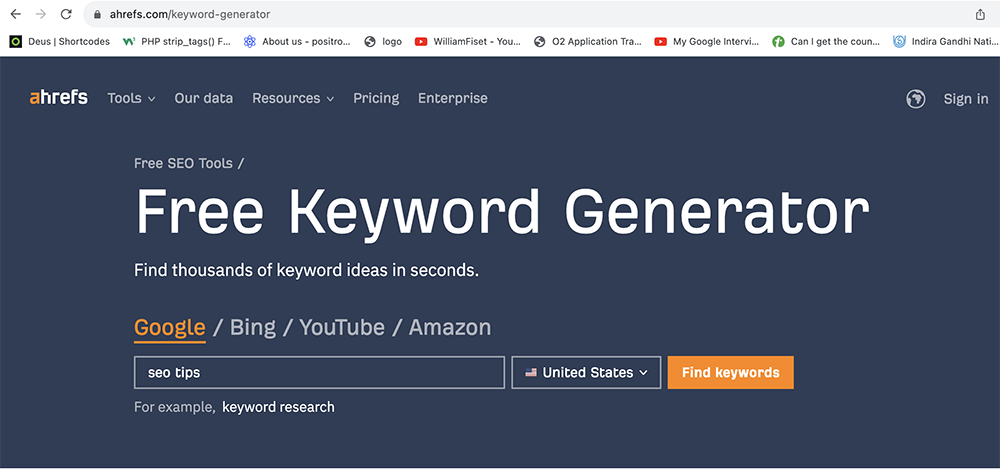Seo tips and tricks to increase website rank in google
Search engine optimization (SEO) is crucial for bloggers to increase their website's visibility and attract more organic traffic. Here are some essential SEO tips for blogging
Keyword Research:
Start by researching relevant keywords and phrases that your target audience is likely to search for. Here I am showing some most usable keywords tools Use tools to identify high-traffic, low-competition keywords.

Quality Content:
Create high-quality, informative, and engaging content that addresses the needs and questions of your audience. Aim for longer, more in-depth articles that provide value.
Keyword Optimization:
Place your target keywords strategically within your content. Use the keyword in the title, headings, and naturally throughout the article. Avoid keyword stuffing, which can negatively impact your rankings.
Optimize Meta Tags:
Write compelling meta titles and descriptions that incorporate your primary keyword. These elements appear in search engine results and can influence click-through rates.
Mobile-Friendly Design:
Ensure your blog is responsive and mobile-friendly. Google places a strong emphasis on mobile usability when ranking websites.
Fast Loading Speed:
vPage speed is a ranking factor. Optimize your blog's loading speed by compressing images, using browser caching, and choosing a reliable hosting provider.Internal Linking:
Link to other relevant articles within your blog. This not only helps with SEO but also encourages readers to explore more of your content.
External Links:
Include outbound links to authoritative and relevant sources. This can help establish your blog as a valuable resource in your niche.
Use Descriptive URLs:
Create clean and descriptive URLs for your blog posts. Avoid using generic or non-informative URLs.
Optimize Images:
Compress and properly tag your images with descriptive alt text. This helps with both SEO and accessibility.
Social Sharing:
Encourage social sharing of your content by adding social sharing buttons to your blog posts. Increased social signals can indirectly impact SEO.
User Experience (UX):
Ensure a user-friendly experience on your blog. A well-organized, easy-to-navigate site with clear CTAs (calls to action) can improve user engagement and reduce bounce rates.
Regular Updates:
Consistently update your blog with fresh, relevant content. Google tends to favor sites that regularly publish new material.
Optimize for Voice Search:
With the rise of voice-activated devices, consider optimizing your content for voice search queries. Focus on more conversational and long-tail keywords.
Monitor Performance:
Use tools like Google Analytics and Google Search Console to track your blog's performance. Pay attention to metrics like organic traffic, click-through rates, and rankings.
Build Backlinks:
Seek opportunities to earn high-quality backlinks from reputable websites in your niche. Guest posting, outreach, and creating link-worthy content can help with this.
Engage with Comments:
Encourage reader engagement by responding to comments on your blog. This can improve user experience and may lead to more shares and links.
Schema Markup:
Implement schema markup where relevant. This can help search engines understand the context of your content and display rich snippets in search results.
Local SEO (if applicable):
If your blog has a local focus, optimize it for local SEO by including your location in key elements like titles, meta descriptions, and content.
Stay Informed:
SEO is constantly evolving, so stay up-to-date with industry trends and algorithm updates. Join SEO forums, read reputable blogs, and follow SEO experts on social media.
Remember that SEO is a long-term strategy, and it may take some time before you see significant results. Patience, consistency, and a commitment to providing value to your audience are key to successful blogging SEO.

